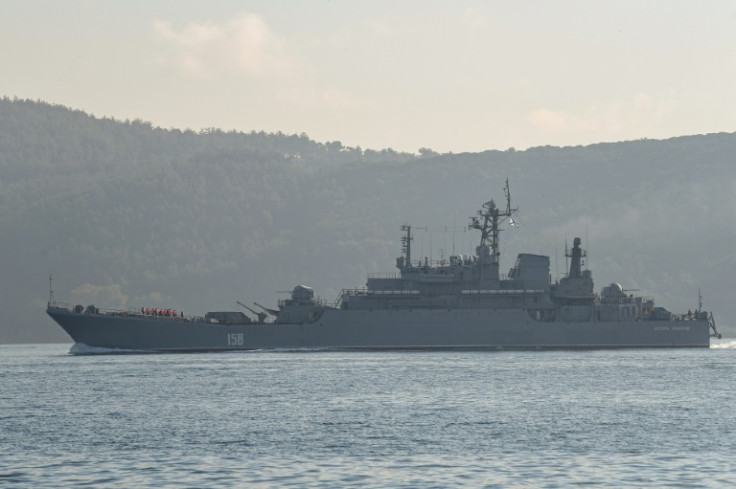Ukraine Lands Blows In Black Sea As Frontline Stagnates

While the frontline on land has remained largely static, Ukraine has destroyed a number of Russian warships in the Black Sea, crucial victories at a moment when Western support for Kyiv's fight against the invasion is wavering.
Although not enough to change the course of the war, every sunken or damaged Russian ship is "a communication victory," deputy director of the Moscow-based Franco-Russian Observatory Igor Delanoe told AFP.
The Ukrainian General Staff announced on Wednesday that it had destroyed the Russian landing ship Caesar Kunikov with naval drones off the coast of Ukraine's Black Sea peninsula of Crimea which was annexed by Russia in 2014.
A large ball of smoke and flames could be seen rising from what appeared to be a ship in footage posted by Ukrainian military intelligence which it said showed the attack on the Caesar Kunikov but AFP has not independently verified.
Landing critical blows at sea allows Kyiv "to momentarily forget its challenges" on the frontline, Delanoe added.
"It also allows them to present some results to Western backers, to show them that it's still worth investing in Ukrainian defence."
Kremlin spokesman Dmitry Peskov declined to comment on the Ukrainian claims, and the Russian defence ministry remained equally silent, stressing instead that it had shot down six Ukrainian drones "over the waters of the Black Sea".
The destruction of the Caesar Kunikov would add to the Ukrainians' extensive Black Sea hit list, which includes the attack on the cruiser Moskva, the Russian fleet's flagship sunk in the spring of 2022, and the Novocherkassk, a large landing ship hit at the end of 2023 while docked in Crimea.
NATO head Jens Stoltenberg on Thursday hailed as a "great achievement" Ukraine's recent gains in the Black Sea, saying the Ukrainians "have been able to inflict heavy losses on the Russian Black Sea Fleet".
Success at sea, while important, "has no impact on the balance of power on land, where there is an unfavourable dynamic for Ukraine," Delanoe told AFP.
Still, it "validates Ukraine's strategy of asymmetrical attacks in the Black Sea."
Despite Russia's threats of strikes and its supposed naval superiority, Ukraine's efforts have managed to keep open a maritime corridor for food exports.
Ukraine lost "a large part of its Navy when Crimea was occupied" by Russia in 2014, maritime analyst and former Turkish naval officer Tayfun Ozberk told AFP.
To compensate, they have been using missiles supplied by the West, underwater mines, and naval drones to deny Russia access, he explained.
The drones are now "capable of striking Russian ships almost anywhere in the Black Sea," including Russian ports far from Ukrainian shores.
While these losses have no significant impact on the front line, they have a "psychological" cost for Moscow, Ozberk added.
Above all, it allows Kyiv to present some victories when the Western camp seems divided in its support for Ukraine.
But US aid has for months been paralysed in Congress, despite pleas from Kyiv and its Western backers for support.
The US Senate on Tuesday approved a $95 billion package for Ukraine, Israel and Taiwan by a comfortable margin, House Speaker Mike Johnson, a Donald Trump ally, has refused to put it to a vote in the lower chamber.
At the start of its invasion of Ukraine, Russia had sought to use its naval power in the Black Sea, launching missiles against land targets and threatening the Ukrainian coastline with an amphibious invasion to strangle Ukraine's vital maritime trade.
But Russia can no longer "prevent Ukrainian trade... with grain shipments back to pre-invasion levels," professor of strategic studies at St Andrews University in Scotland, Phillips O'Brien, told AFP.
"It is an extraordinary failure for the Russians to lose the ability to control Ukrainian trade," he added.
"As for the defensive plan, the areas where they can operate safely are restricted. There are fewer opportunities to bomb Ukraine with missiles. They've lost logistically important landing ships... making it harder to supply Crimea."
In the longer term, "this could affect Russia's perception of Crimea as a critical territory that cannot be lost," researcher at the Estonia-based Baltic Defence College Dumitru Minzarari told AFP.
These victories in the Black Sea bolster one of Kyiv's main objectives: "to undermine Russia's resolve", he added.
© Copyright AFP 2024. All rights reserved.











